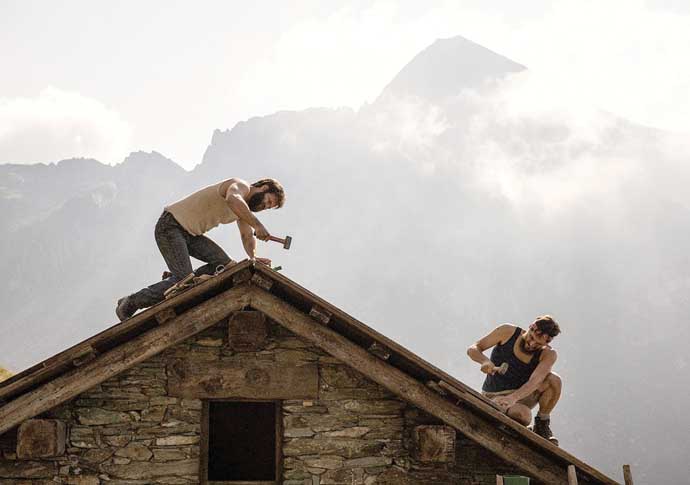Friends face life’s up and downs in The Eight Mountains
Thoughtful Italian drama looks at the impact of the natural world on our psyche
Thursday, 11th May 2023 — By Dan Carrier

Luca Marinelli and Allesandro Borghi in The Eight Mountains [Alberto Novelli for Wildside]
THE EIGHT MOUNTAINS
Directed by Felix van Groeningen and Charlotte Vandermeersch
Certificate: 12a
☆☆☆☆
CLIMBING a mountain is good for the soul. It’s not just the breath in the lungs, not the sense of achievement when you reach a summit.
It’s the chance to step on something so timeless and immovable with a far-reaching vista. It puts life into perspective, and makes the small things you sweat show their true worth.
This impact the natural world has on your psyche is one of the many themes this thoughtful Italian drama seeks to tackle.
Pietro, 11, is about to learn a hard lesson – to be able to appreciate what you have in front of you, to learn that your parents are not infallible – they make mistakes, they need your affirmation.
There are ruminations of what “success” – or happiness – looks like, and making sure each day is appreciated: the geological concept of time is used to show how the petty intrigues of humans are pointless when looked at this way.
Pietro is the Turin-dwelling child whose family take him into the Alps every summer to shrug off the crampedness of the city.
He befriends Bruno, the last child left in a village rapidly emptying of inhabitants. They spend a couple of idyllic summers only children know, exploring the mountains, valleys, rivers, lakes, meadows.
Pietro’s father is a factory worker who loves the mountains and wants to share this with his child.
Bruno’s father, we learn, works abroad, and the boy lives with his mother and an uncle, who produce cheese from their mountain herds.
Pietro’s parents offer to take Bruno to Turin, so he can go to school – but the offer is not taken up.
We flash forward to Pietro’s early adulthood, and witness a relationship-breaking argument between father and son – and then we are treated to another time leap, this time after his father’s death, and we discover what Pietro is doing in his 30s, and compare it to Bruno’s experiences.
After his dad has died, Pietro heads back to the mountains to discover a ramshackle gite his father bought and planned to restore, with Bruno’s help. It leads to Pietro rediscovering their friendship and taking stock of the life he has built.
There are moments of overwhelming beauty, not least from the extraordinary locations. But it is the take on what it is to love, and how time is our only real commodity, that elevates this story.